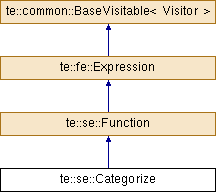The transformation of continuous values to distinct values (Categorize function). More...
#include <Categorize.h>

Public Types | |
| typedef void | ReturnType |
| enum | ThresholdsBelongToType { NONE , SUCCEEDING , PRECEDING } |
| It controls the interval order. More... | |
| typedef Visitor | VisitorType |
Public Member Functions | |
| virtual ReturnType | accept (VisitorType &guest) const=0 |
| It call the visit method from the guest object. More... | |
Initializer Methods | |
| void | setFallbackValue (const std::string &v) |
| const std::string & | getFallbackValue () const |
| std::string | m_fallbackValue |
| The value of the fallbackValue attribute is used as a default value, if the SE implementation does not support the function. If the implementation supports the function, then the result value is determined by executing the function. (Mandatory) More... | |
Detailed Description
The transformation of continuous values to distinct values (Categorize function).
The Symbology encoding specification defines three pre-defined functions for transforming raw data:
- Categorization: The transformation of continuous values to distinct values. This is for example needed to generate choropleth maps from continuous attributes. Another example would be the stepwise selection of different text heights or line widths in dependence from such an attribute;
- Interpolation: Transformation of continuous values by a function defined on a number of nodes. This is used to adjust the value distribution of an attribute to the desired distribution of a continuous symbolization control variable (like size, width, color, etc);
- Recoding: Transformation of discrete values to any other values. This is needed when integers have to be translated into text or, reversely, text contents into other texts or numeric values or colors.
The Thresholds have to be specified in ascending order and (like the LookupValue) have to be of a uniform and orderable type. The value of the function is determined by looking up into which interval between two thresholds the LookupValue falls. The first interval ranges from -Infinity to the first given threshold and the last one accordingly from the last threshold to +Infinity. In case the Categorize (or Interpolate) function is used inside a RasterSymbolizer as a ColorMap, the LookupValue is set to the fixed value "Rasterdata". The Values can be of any type, dependent on which symbolization context the function is employed. Color values (like #00ffff) or numeric values are typical. Whether the Threshold values themselves belong to the preceding or the succeeding interval can be controlled by the attribute thresholdsBelongTo= with the possible values "preceding" and "succeeding" the latter being the default.
- See also
- Function, ParameterValue
Definition at line 90 of file Categorize.h.
Member Typedef Documentation
◆ ReturnType
|
inherited |
Definition at line 58 of file BaseVisitable.h.
◆ VisitorType
|
inherited |
Definition at line 57 of file BaseVisitable.h.
Member Enumeration Documentation
◆ ThresholdsBelongToType
It controls the interval order.
| Enumerator | |
|---|---|
| NONE | |
| SUCCEEDING | |
| PRECEDING | |
Definition at line 99 of file Categorize.h.
Constructor & Destructor Documentation
◆ Categorize() [1/2]
| te::se::Categorize::Categorize | ( | ) |
It initializes a new Categorize.
◆ Categorize() [2/2]
| te::se::Categorize::Categorize | ( | const Categorize & | rhs | ) |
Copy constructor.
- Parameters
-
rhs The other Categorize.
◆ ~Categorize()
| te::se::Categorize::~Categorize | ( | ) |
Destructor.
Member Function Documentation
◆ accept()
|
pure virtualinherited |
It call the visit method from the guest object.
- Parameters
-
guest The guest or visitor.
- Returns
- Any valid value define by the template type R.
◆ addThreshold()
| void te::se::Categorize::addThreshold | ( | ParameterValue * | v | ) |
◆ addValue()
| void te::se::Categorize::addValue | ( | ParameterValue * | v | ) |
◆ clone()
|
virtual |
◆ getFallbackValue()
|
inherited |
◆ getLookupValue()
|
inline |
Definition at line 135 of file Categorize.h.
◆ getThresholds()
| const std::vector<ParameterValue*>& te::se::Categorize::getThresholds | ( | ) | const |
◆ getThresholdsBelongTo()
|
inline |
Definition at line 147 of file Categorize.h.
◆ getThresholdValues()
| const std::vector<ParameterValue*>& te::se::Categorize::getThresholdValues | ( | ) | const |
◆ getValue()
|
inline |
Definition at line 139 of file Categorize.h.
◆ setFallbackValue()
|
inherited |
◆ setLookupValue()
| void te::se::Categorize::setLookupValue | ( | ParameterValue * | v | ) |
◆ setThresholdsBelongTo()
| void te::se::Categorize::setThresholdsBelongTo | ( | ThresholdsBelongToType | t | ) |
◆ setValue()
| void te::se::Categorize::setValue | ( | ParameterValue * | v | ) |
Member Data Documentation
◆ m_fallbackValue
|
protectedinherited |
The value of the fallbackValue attribute is used as a default value, if the SE implementation does not support the function. If the implementation supports the function, then the result value is determined by executing the function. (Mandatory)
Definition at line 88 of file Function.h.
◆ m_lookupValue
|
private |
Mandatory.
Definition at line 155 of file Categorize.h.
◆ m_threshholdsBelongTo
|
private |
(Optional)
Definition at line 159 of file Categorize.h.
◆ m_thresholds
|
private |
A vector of threshold. (Optional)
Definition at line 157 of file Categorize.h.
◆ m_thresholdValues
|
private |
A vector of threshold values. (Optional)
Definition at line 158 of file Categorize.h.
◆ m_value
|
private |
Mandatory.
Definition at line 156 of file Categorize.h.
The documentation for this class was generated from the following file:
- /home/castejon/castejon_files/develop/terralib5/git_release/src/terralib/se/Categorize.h
